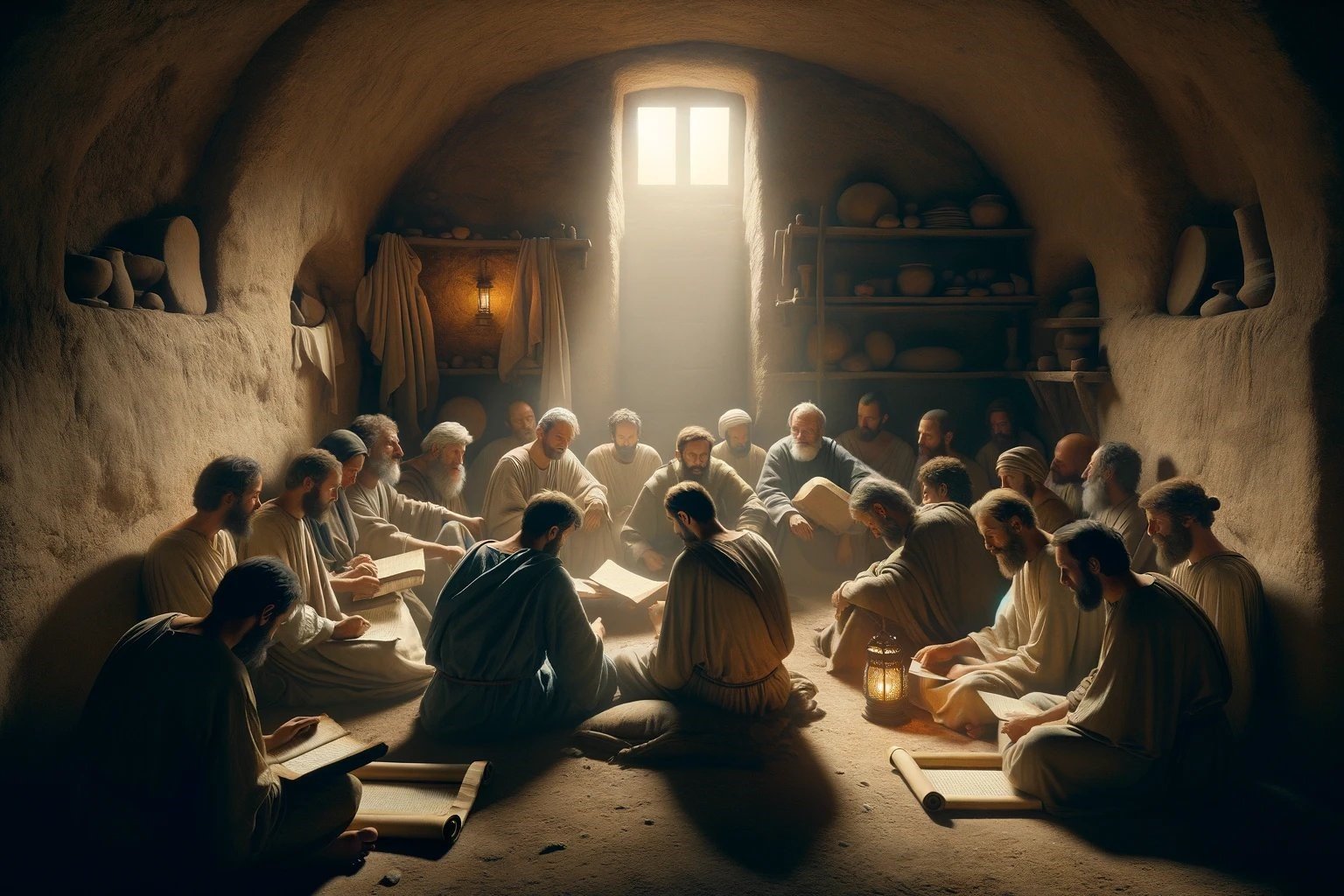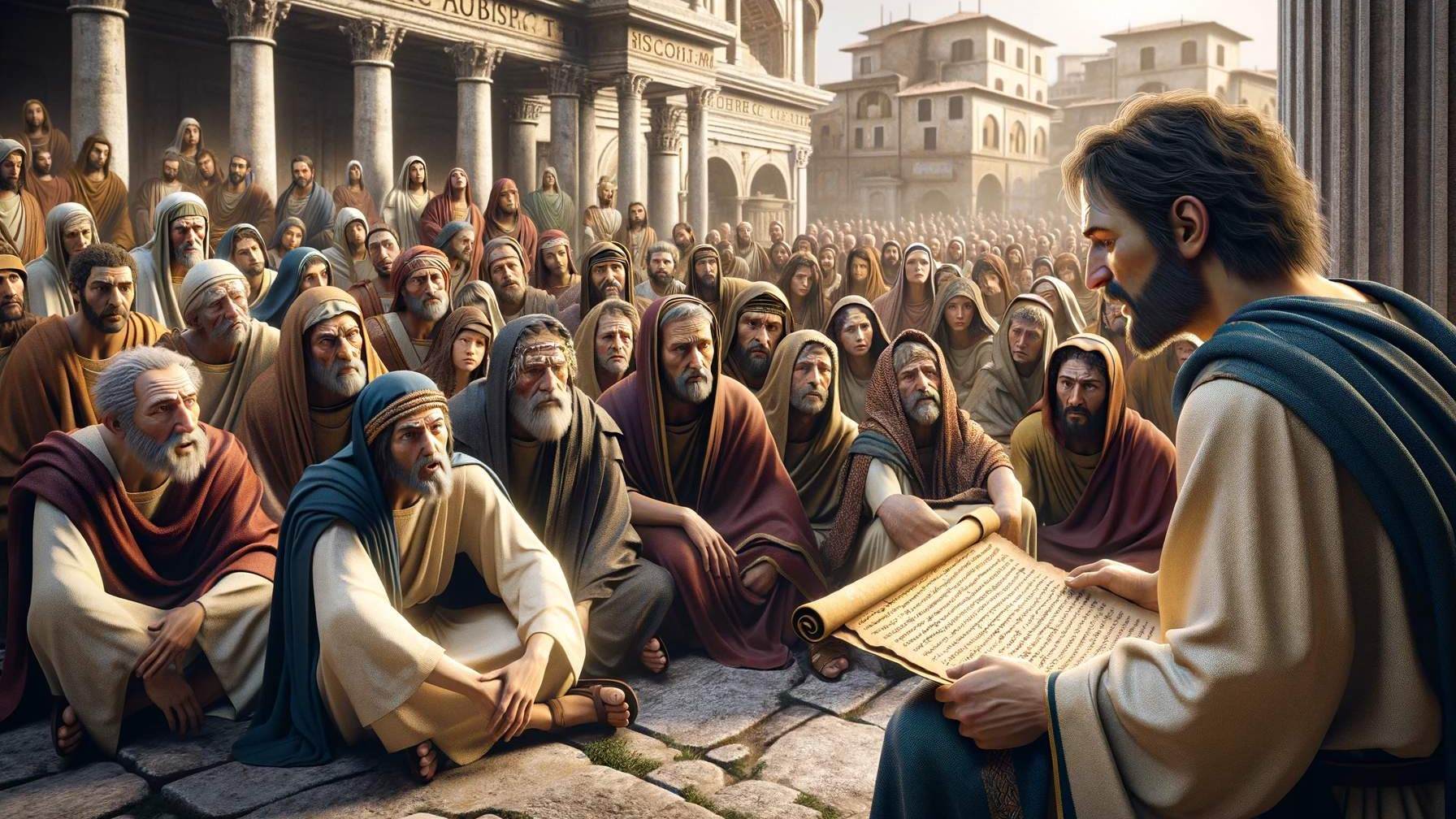Home>Bible Facts>Why Is The Book Of Revelation Important?


Bible Facts
Why Is The Book Of Revelation Important?
Published: February 11, 2024
Peter Smith, Editorial Director at Christian.net, combines deep insights into faith, politics, and culture to lead content creation that resonates widely. Awarded for his contributions to religious discourse, he previously headed a major organization for religious communicators, enhancing dialogue on faith's societal impacts.
Discover the significance of the Book of Revelation and its impact on biblical history. Uncover fascinating Bible facts and insights.
(Many of the links in this article redirect to a specific reviewed product. Your purchase of these products through affiliate links helps to generate commission for Christian.net, at no extra cost. Learn more)
Table of Contents
Introduction
The Book of Revelation, the final book of the New Testament, is a captivating and enigmatic piece of literature that has intrigued and inspired countless individuals throughout history. Also known as the Apocalypse of John, this profound text offers a glimpse into the divine mysteries and the ultimate triumph of good over evil. Its significance extends far beyond its role as a concluding chapter of the Bible; rather, it serves as a powerful testament to the enduring hope and faith of believers.
The Book of Revelation is shrouded in symbolism and imagery, depicting vivid visions of cosmic battles, heavenly realms, and the ultimate fulfillment of God's plan for humanity. Its apocalyptic nature sets it apart from the other books of the New Testament, as it delves into eschatological themes and prophetic revelations. As such, it has sparked intense debate and speculation regarding its interpretation, leading to a wide array of perspectives and theories about its meaning.
Despite its complexity, the Book of Revelation holds a central place in Christian theology and eschatology, offering profound insights into the nature of God, the destiny of humanity, and the ultimate victory of Christ. Its themes of judgment, redemption, and the establishment of a new heaven and earth resonate deeply with believers, serving as a source of comfort, encouragement, and spiritual guidance.
As we embark on a journey to explore the significance of the Book of Revelation, we will delve into its historical context, theological implications, and practical applications. Through this exploration, we will gain a deeper understanding of the enduring relevance and profound impact of this remarkable biblical text. Join us as we unravel the mysteries and unveil the timeless truths contained within the pages of the Book of Revelation.
Historical Context of the Book of Revelation
The Book of Revelation was written by the apostle John while he was exiled on the island of Patmos, during the reign of the Roman Emperor Domitian in the late first century. This historical backdrop is crucial in understanding the circumstances that shaped the composition of this profound text. The early Christian community was facing intense persecution and hardship, as the Roman Empire sought to suppress the spread of the Christian faith. The emperor's demand for divine worship and allegiance posed a direct challenge to the monotheistic beliefs of the Christians, leading to widespread suffering and martyrdom.
In this tumultuous environment, the Book of Revelation emerged as a message of hope and resilience for the persecuted believers. It offered a vision of divine justice and ultimate triumph, reassuring the faithful that God's sovereignty transcended the oppressive powers of the world. The apocalyptic imagery and symbolic language used in the book served as a form of encrypted communication, providing solace and encouragement to the early Christians while evading the scrutiny of the Roman authorities.
The historical context of the Book of Revelation also reflects the broader socio-political landscape of the time. The Roman Empire, with its pervasive influence and imperial cult, represented a formidable force that sought to impose its dominion over all aspects of life. Against this backdrop, the book's portrayal of the cosmic conflict between good and evil, the Lamb and the dragon, and the ultimate victory of Christ carried profound significance for the beleaguered Christian community. It offered a counter-narrative to the prevailing culture of fear and oppression, instilling courage and fortitude in the hearts of the believers.
Furthermore, the use of symbolic language and numerology in the Book of Revelation can be linked to the Jewish apocalyptic tradition, which sought to convey profound spiritual truths through veiled imagery and allegorical representations. This historical and cultural context provides valuable insights into the interpretive framework of the book, shedding light on its intended audience and the underlying message of hope, perseverance, and divine sovereignty.
In essence, the historical context of the Book of Revelation underscores its relevance as a timeless testament of faith and resilience in the face of adversity. By understanding the socio-political dynamics and the challenges confronted by the early Christian community, we gain a deeper appreciation for the enduring significance of this remarkable biblical text.
Theological Significance of the Book of Revelation
The Book of Revelation holds profound theological significance, serving as a rich tapestry of eschatological themes, divine sovereignty, and the ultimate fulfillment of God's redemptive plan. At its core, Revelation offers a compelling portrayal of the cosmic battle between good and evil, culminating in the triumphant return of Christ and the establishment of God's eternal kingdom. This theological framework provides believers with a profound sense of hope, assurance, and steadfast faith in the face of adversity and uncertainty.
One of the central theological themes in Revelation is the sovereignty of God over the course of human history. The book vividly depicts the unfolding of divine judgment and the ultimate vindication of the righteous, underscoring the overarching providence of God in orchestrating the events leading to the consummation of all things. This theological perspective offers believers a profound reassurance that, despite the trials and tribulations of the world, God remains in control, working all things according to His sovereign will.
Furthermore, the Book of Revelation presents a compelling vision of the ultimate triumph of Christ over the forces of darkness and evil. Through its vivid imagery of the Lamb who was slain, the conquering Lion of Judah, and the victorious Rider on the white horse, Revelation conveys the assurance of Christ's ultimate victory and the establishment of His eternal reign. This theological motif instills believers with a deep sense of confidence in the redemptive work of Christ, inspiring them to persevere in faith and anticipation of His glorious return.
Moreover, Revelation offers profound insights into the nature of divine judgment and the ultimate restoration of creation. The book's portrayal of the final judgment, the resurrection of the dead, and the renewal of heaven and earth underscores the theological truth of God's righteous judgment and His redemptive purposes for all creation. This theological perspective invites believers to live in anticipation of the new heaven and earth, where God will dwell among His people, wiping away every tear and ushering in an era of eternal peace and fellowship.
In essence, the Book of Revelation's theological significance lies in its portrayal of God's sovereignty, Christ's ultimate triumph, and the consummation of God's redemptive plan for humanity and creation. Through its rich imagery and profound theological themes, Revelation offers believers a compelling vision of hope, assurance, and steadfast faith in the face of the complexities of human existence.
Practical Application of the Book of Revelation
The Book of Revelation, despite its enigmatic and symbolic nature, holds profound practical significance for believers in the present age. While its apocalyptic imagery and eschatological themes may seem distant and otherworldly, the message of Revelation carries tangible implications for the daily lives of Christians. By exploring the practical application of this remarkable biblical text, believers can glean valuable insights that inform their faith, conduct, and outlook on the world.
First and foremost, the Book of Revelation serves as a source of encouragement and perseverance for believers facing adversity and persecution. Its portrayal of the ultimate triumph of Christ and the vindication of the faithful offers a powerful reminder that, despite the trials and tribulations of life, God remains sovereign and faithful to His promises. This practical application of Revelation inspires believers to stand firm in their faith, knowing that their ultimate victory is assured in Christ.
Furthermore, the ethical and moral exhortations found within the letters to the seven churches in Revelation provide practical guidance for believers in navigating the complexities of Christian living. The call to persevere in faith, resist compromise, and maintain steadfast devotion to Christ resonates deeply with the practical challenges faced by believers in every generation. The timeless relevance of these exhortations underscores the enduring applicability of Revelation to the daily lives of believers.
Moreover, the Book of Revelation invites believers to cultivate a mindset of hope and anticipation of Christ's return. This practical application of Revelation encourages believers to live with a sense of urgency and purpose, knowing that the present age is transient and that the ultimate fulfillment of God's redemptive plan is on the horizon. By embracing this eschatological perspective, believers are motivated to live with a sense of eternal perspective, investing their lives in that which has lasting significance in light of God's ultimate purposes.
Additionally, the ethical imperatives and warnings against idolatry and compromise found in Revelation serve as practical admonitions for believers to remain faithful and vigilant in the midst of a world fraught with moral and spiritual challenges. The practical application of these exhortations is evident in the call for believers to uphold their commitment to Christ, resist the allure of worldly temptations, and remain steadfast in their witness for the gospel.
In essence, the practical application of the Book of Revelation encompasses a wide array of insights that inform the daily lives and spiritual journey of believers. By embracing its message of encouragement, ethical guidance, eschatological hope, and moral vigilance, believers can draw strength, wisdom, and inspiration from this profound biblical text as they navigate the complexities of faith and discipleship in the present age.
Conclusion
In conclusion, the Book of Revelation stands as a testament to the enduring relevance and profound impact of biblical literature. Its historical context, theological significance, and practical application converge to offer believers a rich tapestry of hope, assurance, and guidance in the complexities of human existence. The book's portrayal of divine sovereignty, Christ's ultimate triumph, and the consummation of God's redemptive plan provides believers with a compelling vision of the ultimate fulfillment of God's purposes for humanity and creation.
The historical context of the Book of Revelation, set against the backdrop of intense persecution and socio-political upheaval, underscores its role as a message of resilience and hope for the early Christian community. The book's symbolic language and apocalyptic imagery served as a form of encrypted communication, offering solace and encouragement while evading the scrutiny of the Roman authorities. Understanding this historical context provides valuable insights into the interpretive framework of the book and the enduring significance of its message of faith and endurance in the face of adversity.
Furthermore, the theological significance of the Book of Revelation lies in its portrayal of God's sovereignty, Christ's ultimate triumph, and the consummation of God's redemptive plan. Through its rich imagery and profound theological themes, Revelation offers believers a compelling vision of hope, assurance, and steadfast faith in the face of the complexities of human existence. The book's theological framework provides believers with a profound sense of hope, assurance, and steadfast faith in the face of adversity and uncertainty.
Moreover, the practical application of the Book of Revelation encompasses a wide array of insights that inform the daily lives and spiritual journey of believers. By embracing its message of encouragement, ethical guidance, eschatological hope, and moral vigilance, believers can draw strength, wisdom, and inspiration from this profound biblical text as they navigate the complexities of faith and discipleship in the present age.
In essence, the Book of Revelation stands as a timeless testament of faith and resilience in the face of adversity. Its enduring relevance and profound impact continue to inspire and guide believers, offering a compelling vision of hope, assurance, and steadfast faith in the midst of a world fraught with challenges and uncertainties. As we reflect on the significance of the Book of Revelation, we are reminded of its enduring message of hope, resilience, and the ultimate triumph of God's redemptive plan.















